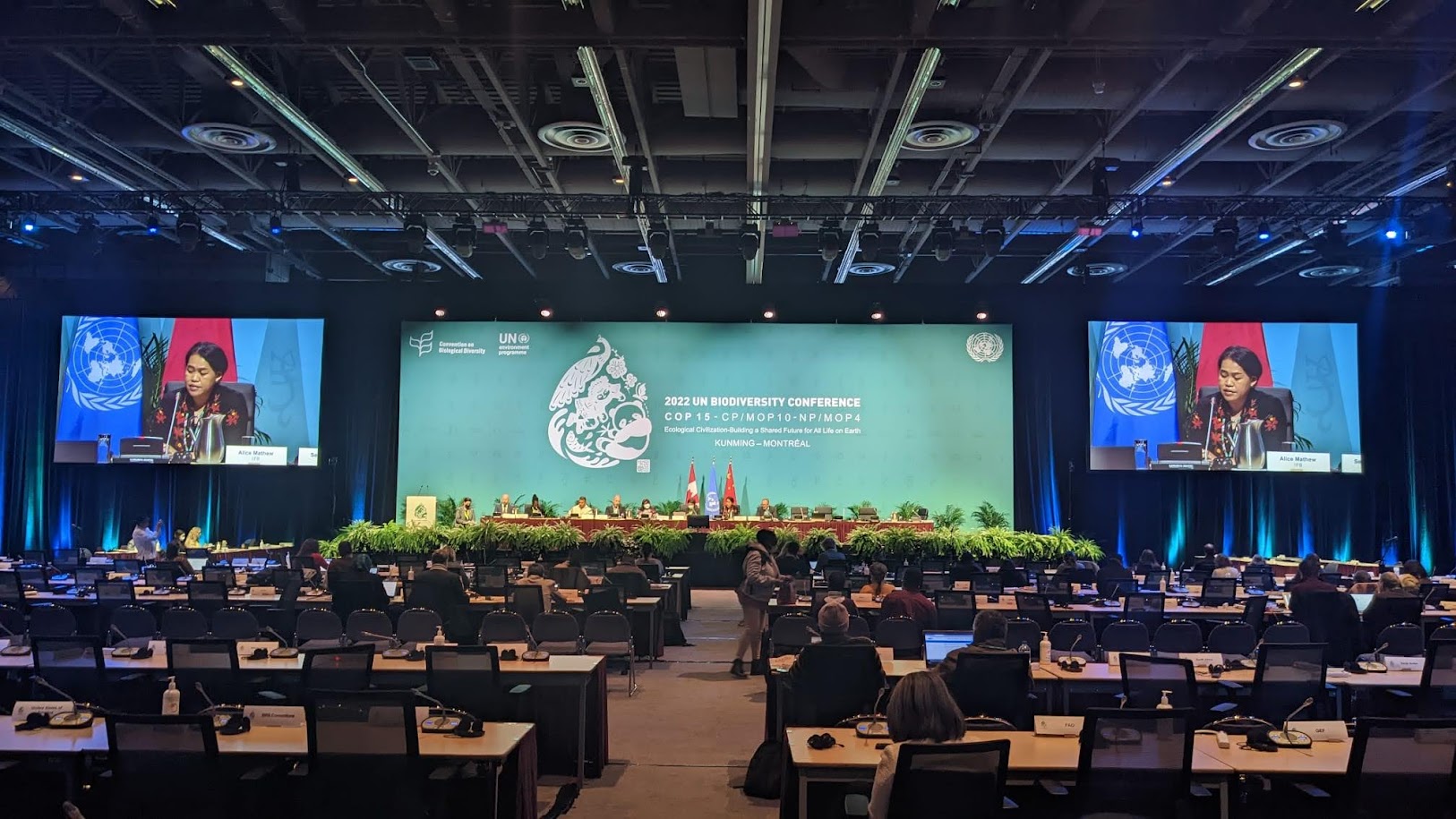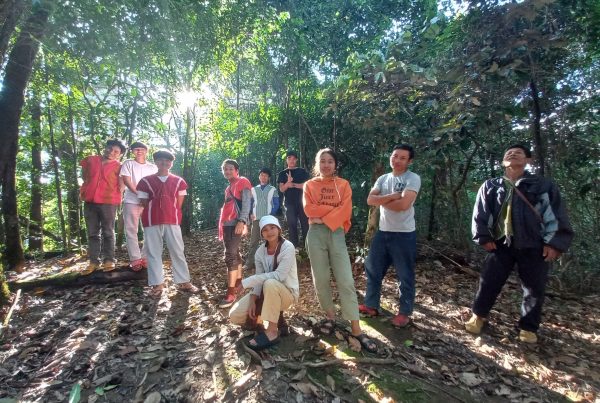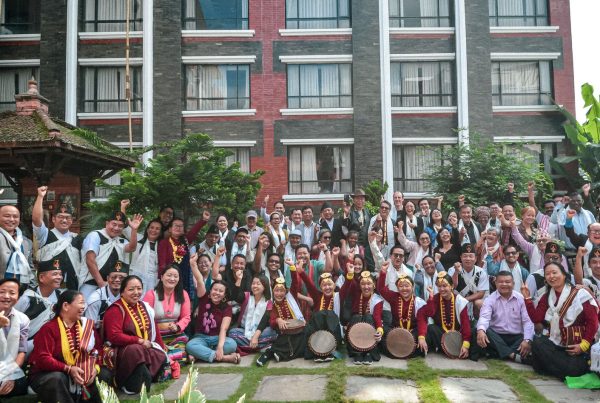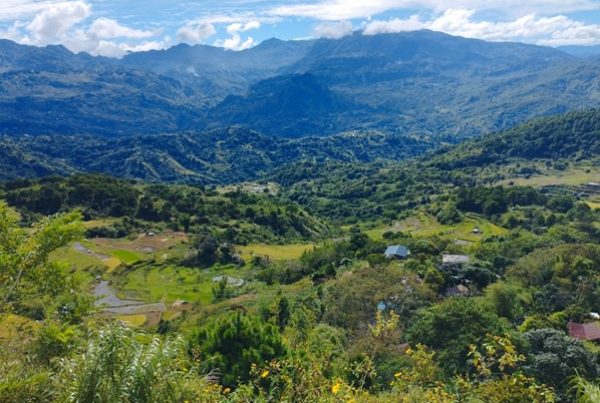Following two weeks of often tense negotiations of the Kunming-Montreal Global Biodiversity Framework (GBF), in Montreal, Canada, the International Indigenous Forum on Biodiversity (IIFB) praised the text for its “strong language on respect for the rights of Indigenous Peoples and local communities.”
In a statement to the closing plenary of the meeting, the IIFB said:
“The IIFB celebrates the timely recognition of Indigenous Peoples and local communities’ contributions, roles, rights and responsibilities to Mother Earth in the Kunming-Montreal Global Biodiversity Framework.
“We have spoken and you have heard us, let us now put those words into action. […] Let us move swiftly towards implementation, build meaningful partnerships, and ensure adequate and direct access of Indigenous Peoples and local communities to resources to ensure that we achieve the ambition set out in this Framework.”
Speaking on the final day of the meeting, Co-Chair of the IIFB, Lucy Mulenkei from Kenya, Executive Director of IIN, said “Indigenous Peoples and local communities are happy that finally we are here. With most of the recommendations that we had submitted and negotiated already reflected. We leave Montreal happy and ready for the implementation journey. We are glad we never gave up even when times were tough.”
“We still have a journey, a journey that Indigenous Peoples and local communities have always taken. We will move forward to ensure the implementation of the GBF is a success,” she said.
The urgency of the environmental crisis does not end with the signing of the Framework, stated IIFB.
“We must work quickly and efficiently for its implementation,” said Lakpa Nuri Sherpa, IIFB Co-Chair from Nepal and Programme Coordinator at AIPP, delivering the IIFB’s closing statement.
“From the depths of our territories, our ancestors and authorities are urging serious actions to protect our Mother Earth and all life, together with us,” he said.
“The voices of Indigenous Peoples are the voice of Nature”, said Viacheslav Shadrin, Chief of the Yukagir Indigenous Peoples from Russian Arctic
“It’s historic. It’s a moment to celebrate,” said Jennifer Tauli Corpuz, an IIFB representative from the Kankana-ey Igorot People of Mountain Province in the Philippines.
Viviana Figueroa, from the Omaguaca-Kolla peoples in Argentina, speaking on behalf of IIFB, said “they are recognising that Indigenous Peoples can also make contributions to biodiversity conservation.”
“For us, it’s a major shift – they are recognising this important role that was invisible,” she said.
She particularly welcomed the inclusion of indigenous rights into Target 3 on protecting one third of the world’s ocean and land territory (the ‘30×30’ target).
“This is incredibly significant, as without the inclusion [of Indigenous Peoples’ rights] we could suffer human rights violations in the name of conservation,” said Figueroa.
The IIFB welcomed the recognition of the efforts of Indigenous Peoples and local communities (IPLCs), and urge for the increased direct access to financial resources for all IPLCs in the seven socio-cultural regions inclusive of all landscapes and seascapes, less bureaucratic financial mechanisms, and inclusion in the GBF governance committees to better design and implementation of grants.
The agreement was also praised as being strong on customary sustainable use of natural resources.
Aslak Holmberg, president of the Saami Council in Finland and the IIFB’s regional coordinator for the Arctic, said that states and Indigenous Peoples and local communities will have to work together to make the biodiversity framework into a reality. Holmberg’s traditional fishing practices – protected in the GBF under the terms of “customary sustainable use” – were criminalised by fishing regulations in 2017.
The final text approved at COP15 should help to avoid such problems in future as it underlines the need for Indigenous Peoples to be able to fulfil their rights to “customary sustainable use” of natural resources. Although local laws can be very powerful, Holmberg is hopeful that cases such as this will now be minimised as states and peoples work together to achieve a sustainable future.
The Kunming-Montreal GBF recognizes the integrity and distinct nature of the lands, territories and resources of Indigenous Peoples and local communities, and their full and equitable participation in decision-making towards implementing the framework.
IIFB welcomes partnership in applying the adopted monitoring and reporting framework through community-based monitoring. Robust indicators for monitoring contributions of Indigenous Peoples and local communities will provide a fuller picture of post-2020 GBF implementation, also applying indigenous concepts and local languages.
“The approval of the Post-2020 Global Biodiversity Framework creates challenges for the national implementation, particularly for the recognition and respect of Indigenous Peoples’ rights,” said Ramiro Batzin, Co-Chair of the IIFB, from Guatemala.
“The IIFB is ready to work with governments to implement the GBF at the national level,” he said.
Type: Press Release
Region: Global
Theme: Community-led conservation; International Processes; Land and resource rights; Sustainable Livelihoods; Traditional and local knowledge
Partner: Indigenous Information Network (IIN); Asia Indigenous Peoples Pact (AIPP)
Tags: Convention on Biological Diversity (CBD); COP15
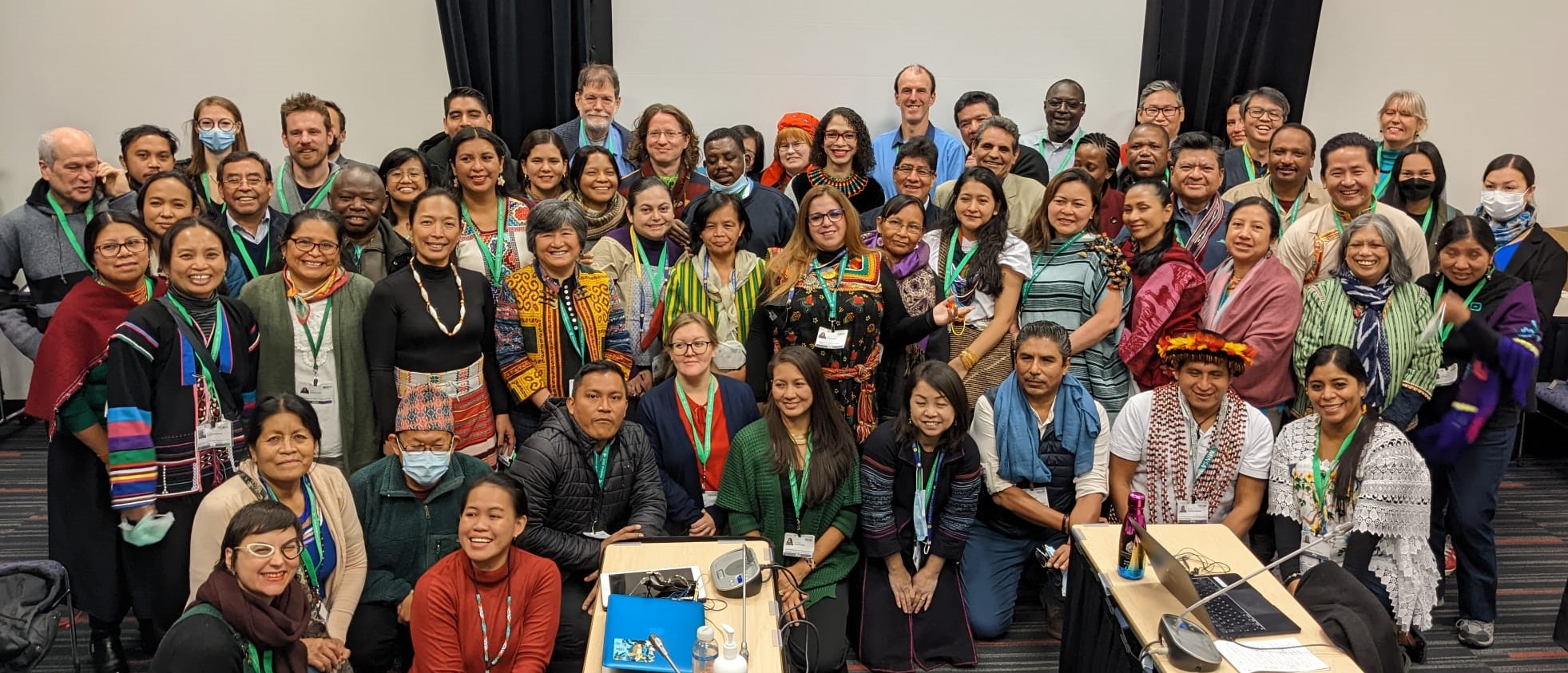
IIFB Indigenous caucus at COP15 in Montreal, Canada. Credits Tom Dixon, FPP
Annexe I – COP15 closing statement of the International Indigenous Forum on Biodiversity (IIFB), given by Co-Chair Lakpa Nuri Sherpa, AIPP
Montreal, 19 December 2022
For 20 days we have been meeting in Montreal, traditionally known as Tiohtià:ke, the traditional territory of Kanien’kehá:ka (Mohawk) nation which has been welcoming us with cold, sunny, rainy, and snowy weather.
The International Indigenous Forum on Biodiversity (IIFB) celebrates the timely recognition of Indigenous Peoples and local community contributions, roles, rights and responsibilities to Mother Earth in the Kunming-Montreal Global Biodiversity Framework (GBF).
The urgency of the environmental crisis does not end with the signing of the GFB. We must work quickly and efficiently for its implementation. From the depths of our territories, our ancestors and authorities are urging serious actions to protect our Mother Earth and all life, together with us.
The Post-2020 GBF recognizes the integrity and distinct nature of the lands, territories and resources of IPLCs and our full and equitable participation in decision-making towards its implementation. IIFB will be your partners in applying the adopted monitoring and reporting framework through community-based monitoring. Robust indicators for monitoring contributions of IPLCs, will provide a fuller picture of post-2020 GBF implementation, also applying indigenous concepts and local languages.
We have spoken and you have heard us, let us now put those words into action.
Recognizing our efforts also means increased direct access to financial resources for all IPLCs in the seven bio-cultural regions inclusive of all landscapes and seascapes, less bureaucratic financial mechanisms, and inclusion in the GBF governance committees to better design and implementation of grants. Indigenous women welcome the adoption of Target 23 and the Gender Plan of Action. Its implementation will be enriched by the Inter-American Belem do Para Declaration, the report of the Special Rapporteur on the Rights of Indigenous Peoples on Indigenous women and the recent CEDAW General Recommendation 39 on the rights of indigenous women and girls.
Regarding the 12th meeting of Article 8j and Related Provisions, we hope that the necessary resources will be made available to ensure broad participation of Indigenous Peoples and local communities to consider new work programme and institutional arrangements to take our work forward. A face-to-face meeting of AHTEG to provide advice on a new programme will be crucial, and must be promptly convened, including preparatory meetings by IPLCs.
We give thanks to all our financial partners, particularly to contributors to the Voluntary Fund for our attendance at COP15.
We also give our special thanks to our indigenous brother and sisters in Canada, the Chinese Government Presidency, the Government of Canada for hosting us, and all Parties who worked tirelessly with us for the adoption of a strong and transformative biodiversity framework. Thank you Mr Chair.
